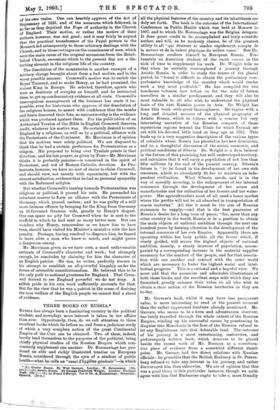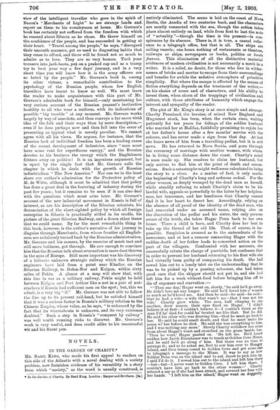THREE BOOKS ON RUSSIA.* Rums has always been a fascinating
country to the political student, and nowadays more interest is taken in her affairs than ever. Opportunely, then, do we call attention to three excellent books which lie before us, and from a judicious study of which a very complete notion of the great Continental Empire of the Czar can be obtained. Two of them, indeed, hardly lend themselves to the purposes of the publicist, being chiefly physical studies of the Russian Empire which con- veniently supplement one another. Dr. Bonmariage has pro- duced an able and richly illustrated treatise on European Russia, considered through the eyes of a student of public health—what he calls an "essai &hygiene genexale"—in which
ne t1.) Greater Russia. By Wirt Gerrare. London : W. Heinemann. ries. . —(2. Asiatic Russia. By George Frederick Wright. London Eveleigh N --(3.) La Russia &Swops. Par le Dr. A. Bonmariage. Bruxelles:
Smear. 20 fr.1
all the physical features of the country and its inhabitants are duly set forth. The book is the outcome of the International Conference on Public Health which was held at Moscow in 1897, and to which Dr. Bonmariage was the Belgian delegate. It does great credit to its accomplished and truly scientific author, and will, as he modestly claims, be of the greatest utility to all " qui desirent se rendre rapidement compte de la nature et de la valour physique du milieu russe." But Dr. Bonmariage confines himself to European Russia. For- tunately an American student of the earth comes in the nick of time to supplement his work. Dr. Wright tells us that when he recently contemplated a journey through Asiatic Russia in order to study the traces of the glacial period, he "found it difficult to obtain the preliminary com- prehensive knowledge of the country which would render such a trip most profitable." He has compiled the two handsome volumes now before us for the sake of future travellers in a similar predicament, and they will also be most valuable to all who wish to understand the physical basis of the vast Russian power in Asia. Dr. Wright has done this work with great thoroughness. He begins with a long and detailed account of the physical geography of Asiatic Russia, which he follows with a concise but very interesting narrative of the Russian conquest of those mysterious regions beyond the Urals for which Yermak set out with his devoted little band as long ago as 1582. This leads up to a very suggestive description of the various types of colonists whom Russia has planted in her new dominions, and to a thoughtful discussion of the social, economic, and political conditions of Siberia. Dr. Wright is a firm believer in the future of this promising but still undeveloped territory, and calcu;ates that it will carry a population of not less than fifty millions by the end of the present century. Siberia's future is " to be found in the development of her own rich resources, which so abundantly fit her to maintain an inde- pendent civilisation. What Siberia needs, and is in the way of speedily securing, is the enlargement of her internal commerce through the development of her mines and manufactories and the utilisation of her forests and her water- power. Her agriculturalists most of all need a home market where the profits will not be all absorbed in transportation of coarse material." All this it must be the aim of Russian statesmen to supply,—and that is the best guarantee of Russia's desire for a long term of peace, "for, more than any other country in the world, Russia is in a position to obtain the main objects of national ambition through the next one hundred years by turning attention to the development of the internal resources of her own Empire. Apparently there are operating within her body politic all the forces which, if wisely guided, will secure the highest objects of national ambition, namely, a steady increase of population, accom- panied by a corresponding increase in the material supplies necessary for the comfort of the people, and for that associa- tion with one another and contact with the outer world which are necessary to foster the highest social and intel- lectual progress." This is a rational and a hopeful view. We must add that the numerous and admirable illustrations of both these books, and the excellent maps with which they are furnished, greatly enhance their value to all who wish to obtain a clear notion of the Russian territories ae they are to-day.
Mr. Gerrare's book, whilst it may have less permanent value, is more interesting to read at the present moment than the rather impersonal treatises already mentioned. Mr. Gerrare, who seems to be a keen and adventurous observer, has lately travelled through the whole extent of the Russian Empire, winding up his successful career by penetrating in disguise into Manchuria in the face of the Russian refusal to let any Englishman into that debatable land. The outcome of his journey is a most entertaining, instructive, and picturesquely written book, which deserves to be placed beside the recent work of Mr. Norman as a corrobora- tive piece of evidence from a somewhat different stand- point. Mr. Gerrare had few direct relations with Russian officials : he grumbles that the British Embassy in St. Peters- burg refused to take any interest in his journey, and rather discouraged him than otherwise. We are of opinion that this was a good thing in this particular instance, though we quite agree with him that Embassies ought to take a more friendly
view of the intelligent traveller who goes in the spirit of Bacon's "Merchants of Light" to see strange lands and. report on them to his countrymen at home. Mr. Gerrare's book has certainly not suffered from the freedom with which he roamed about Siberia as he chose. He threw himself on the confidence of the people, and has succeeded in getting at their heart. " Travel among the people," he says, f' disregard their uncouth manners, get so used to disgusting habits that they cease to offend, and there will be found not so much to admire as to love. They are so very human. Tuck your trousers into jack-boots, put on a peaked cap and as a tramp try to beat your way a few days' journey, and in a very short time you will know how it is the army officers are so hated by the people." Mr. Gerrare's book is, among its other virtues, a remarkable contribution to the psychology of the Russian people, whom few English travellers have learnt to know so well. We must leave the reader to make acquaintance with this part of Mr. Gerrare's admirable book for himself,—only mentioning his very curious account of the Russian peasant's instinctive hostility to all who wear a uniform, with its indications of possible " big trouble " at any moment. Mr. Gerrare works largely by way of anecdote, and thus conveys a far-more vivid idea of the folk and their ways than by mere description,— .even if he does perhaps now and then fall into the error of presenting as typical what is merely peculiar. We cannot -agree with all his views. He argues, for instance, that the Russian lack of individual freedom has been a leading cause of the recent development of industries, since " man must have some vent for superfluous energy," and the Russian devotes to his business the energy which the Englishman fritters away on politics ! It is an ingenious argument, but is upset by the single fact that Mr. Gerrare calls the chapter in which he deals with the growth of Russian industrialism " The New America." Nor can we in the least share our author's admiration for the Protective policy of M. de Witte, although it must be admitted that that policy has done a great deal in the fostering of industry during the past few years ; but it remains to be seen if it can also deal with the questions which must arise later. Mr. Gerrare's account of the new industrial movement in Russia is full of interest, as are his description of the Siberian colonists, his denunciation of the short-sighted policy by which all foreign enterprise in Siberia is practically stifled in its cradle, his picture of the great Siberian Railway, and a dozen other items that we could name. By far the most remarkable. thing in this book, however, is the author's narrative of his journey in -disguise through Manchuria, from whose frontier all English- men are sedulously turned back by the Russian administration. Mr. Gerrare and his camera, by the exercise of much tact and still more boldness, got through. He saw enough to convince him that the Russian talk about evacuation is mere dust thrown in the eyes of Europe. Still more important was his discovery - of a hitherto unknown strategic railway which the Russian -engineers have laid from a point near Khailar, on the Siberian Railway, to Dolon-Nor and Kalgan, within sixty miles of Pekin. A glance at a map will show that, with this line in use as a military railway, Pekin might be held between Kalgan and Port Arthur like a nut in a pair of nut- crackers if Russia had sufficient men on the spot; but, this we admit, is a very big "if." Mr. Gerrare was not able to follow the line up to its present rail-head, but he satisfied himself that it was a serious factor in Russia's military relation to the Chinese Empire, whose value, as he says, " is enhanced by the fact that its whereabouts is unknown, and its very existence doubted." Such a step in Russia's " conquest by railway" was well worth running risks to discover. Mr.. Gerrare's work is very useful, and does credit alike to his resourceful wit and his fluent pen.











































 Previous page
Previous page